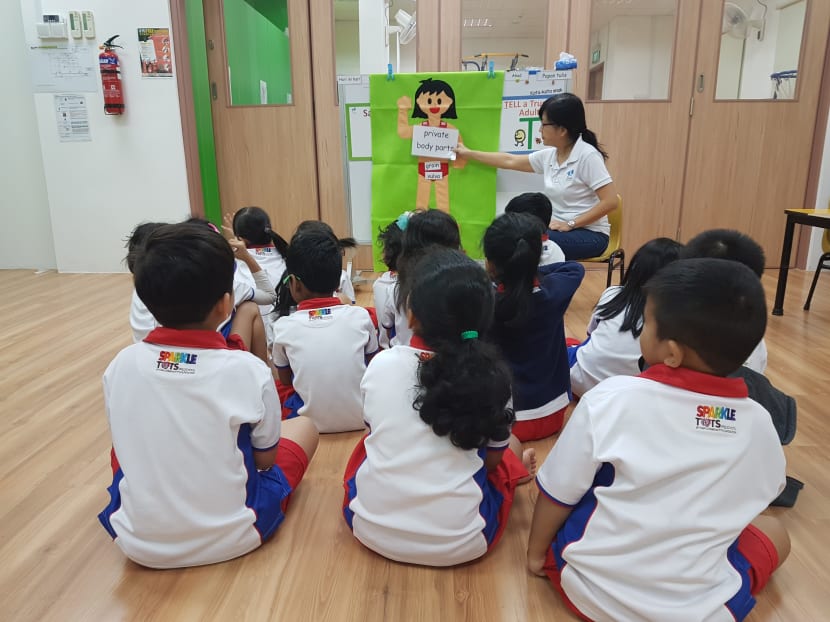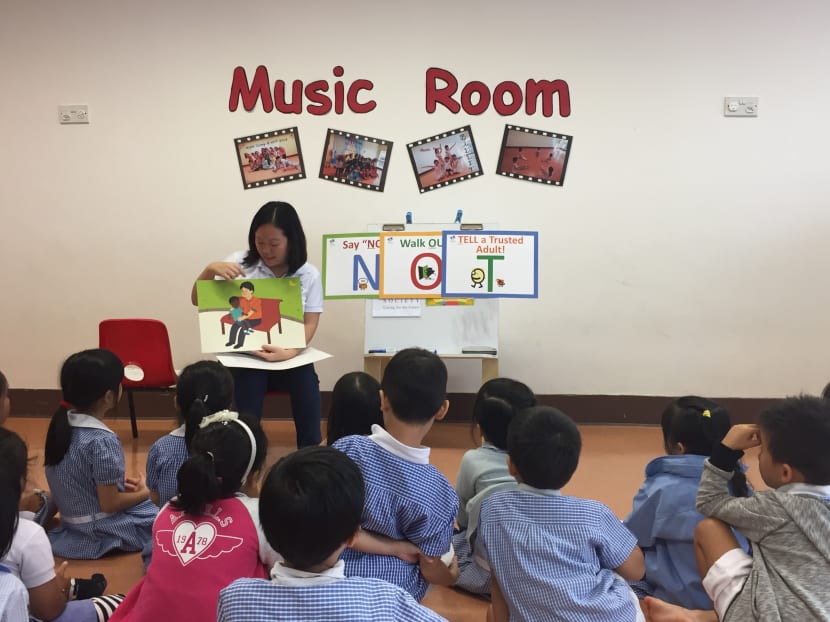Teaching children about body safety: Call genitals by proper terms for a start, experts advise parents
SINGAPORE — A stranger who molested a schoolboy in public. A man luring two girls into his flat and sexually assaulted them. Educators molesting students. Fathers sexually abusing children. Reading news reports on children being sexually abused, often by people they know or trusted, made Ms June Low realise that she has to talk to her children about sex and their bodies.

Ms Lin Xiaoling, deputy director of advocacy and research department at Singapore Children’s Society, said that just as you would teach your child about “head”, “leg” or “hand”, the same standard should apply when it comes to the genitals.
SINGAPORE — A stranger who molested a schoolboy in public. A man who lured two girls into his flat and sexually assaulted them. Teachers preying on students. Fathers sexually abusing their own children.
Reading news reports on children being victims of sex crimes — where the perpetrators are often people they know — Ms June Low decided that she has to talk to her children about sex and their bodies.
But when her four-year-old daughter started pointing out the differences between her private parts and those of her baby brother, Ms Low realised that she did not know how to approach the topic.
“I always thought that I would be an open parent but I was embarrassed about it,” the 30-year-old who works in the public service sector told TODAY.
That spurred her and her husband, a 31-year-old engineer, to enrol in a KidzLive programme conducted by the Singapore Children’s Society earlier this year — a talk for parents on empowering children with body safety skills.
Experts interviewed by TODAY said that it is important for children to learn such skills at a young age. These include being able to tell the differences between male and female anatomy and learning what constitutes appropriate behaviour and boundaries in terms of human touch.
And when it comes to conversations about sexuality matters, they urged parents to talk to their children sooner rather than later. These discussions could start from the preschool years (see tips at the end of the report).
Ms Low’s own experience when she was growing up was that her parents avoided talking to her about sex. The first conversation about it with her mother was when she was in Secondary 1.
“It was really embarrassing for the both of us. I felt that the talk had come too late. By then, I had already gained information on (sexuality-related matters) from friends, so I couldn’t really absorb what my mum said.”
WHY TALKS SHOULD START EARLY
But while parents such as Ms Low are aware of the importance of introducing age-appropriate sexuality education and body safety skills to their preschoolers, the topic remains a taboo subject among most families.
Experts said some parents feel that discussing this too early could ruin their child’s innocence or encourage an unhealthy interest in sex.
Ms Lin Xiaoling, deputy director of advocacy and research department at Singapore Children’s Society, said: “A lot of times, parents imagine that when they talk to children about sexuality-related issues, they will experiment and touch their friends.”
Research shows otherwise.
Ms Vyda S Chai, a clinical psychologist at Think Kids, which provides behavioural therapy for special needs children, said that numerous studies have shown that a comprehensive sexuality education at an early age delays the onset of sexual activity.
Ms Lin agreed. She pointed out that more than just about sex, sexuality education also covers topics such as learning about human body parts, setting boundaries as well as how to form healthy relationships.
One of the KidzLive programmes that Singapore Children’s Society runs is called KidzLive: I Can Protect Myself. It caters to children and teaches them to protect themselves from sexual abuse.
The team also runs a teacher training course for preschool educators to conduct the KidzLive programmes.
In this day and age when information, or misinformation, about sex is just a click away, side-stepping the issue could be dangerous.
Dr Lim Boon Leng, psychiatrist at Dr BL Lim Centre for Psychological Wellness, said: “When sex education is swept under the carpet, not discussed and the children are ignorant, they may then try to learn about sex on their own through Internet pornography or experimentation.”
Ms Chai said: “By providing knowledge and understanding, we are preparing them to deal with such issues, voice concerns and instill awareness for safer practices.”
Ms Lin said that giving children the right information early protects them from wrong messages that they may eventually get from their friends, online sources or the media.
WHY PARENTS HAVE TO SET THE TONE
Dr Lim said that some elements of sexuality education should start from the time children enter preschool, because they will be spending an increasing amount of time away from their primary caregivers.
“This may include concepts of where the private parts are, and that these are areas that should not be touched by others,” he said.
Dr Lim stressed that while schools may cover the technical aspects of sex education, it is best for parents to guide their children.
“Our society is a multi-racial, multi-religious and multi-faceted one and every family has different values in place,” he said. This might include views on pre-marital sex.
Rather than having a one-time talk, the experts also recommend weaving age-appropriate sexuality education into everyday conversations at opportune moments and building the information over time.
Ms Chai said: “Encourage your child to ask questions. It’s very important that we know what’s going on for our children, especially in the social media era we live in today.”
Ms Lin said that the basics, such as using age-appropriate words and phrases and avoiding using pet names for private parts, could even start right from birth.
“For example, when you do a diaper change, parents can say ‘I’m going to wipe your backside’, or ‘I see that your vulva is dirty and I’m going to wipe it clean’,” she said.
“By using these proper terms in a matter-of-fact manner, it helps very young children learn the vocabulary from a young age. When they eventually know their body parts, parents can build on the messages.”
WHAT CHILDREN CAN PICK UP
Parents may feel that preschoolers are way too young to understand their bodies and the dangers they may face from sexual predators.
However, Ms Lin said that in 2015, a programme evaluation of around 250 children aged four to six who underwent Singapore Children’s Society’s KidzLive programme found that they were able to pick up and retain information they received.
“We ran a pre- and post-programme evaluation, and found significant learning in two key areas.
“After the programme, the children were able to identify where their private body parts are and knew what to do if someone were to touch them on their private areas,” Ms Lin said.
“A lot depends on the approach and language used. Although you can’t expect very young children to have the cognitive ability to understand complex matters, the kind of words and phrases you use are important.”

In the KidzLive programme, trainers use interactive elements, such as a story, a song and teaching materials such as cloth dolls, to teach children about appropriate boundaries, differentiate between “good” and “bad” touches, and how to tell a trusted adult if they are touched inappropriately.
How sexuality education is delivered is just as important, Ms Chai said.
“If parents (and other adults) are anxious and use the ‘fear factor’ when approaching the topic, this will inadvertently introduce anxiety,” she said.
Dr Lim advised parents who are unsure of how to guide their children to get more information from appropriate sources, such as books and websites by reliable authorities on the subject.
WHERE TO FIND RESOURCES
For a start, Ms Lin said parents could look for resources developed by the Singapore Children’s Society.
In 2012, it developed an information booklet for parents of preschoolers who have undergone the KidzLive programme.
The booklet, which is also available online on Singapore Children’s Society’s website, provides tips on how parents and caregivers can reinforce body safety skills, as well as information on child sexual development milestones.
In May this year, the society launched a children’s picture book on body safety — titled Jun and the Octopus — to help caregivers and educators broach the topic of child sexual abuse.
In the story, which is in an Asian folklore style and is suitable for children of all ages, a young boy confronts his fears and finds the courage to tell his parents about a sexual abuse.
The aim, Ms Lin said, is to help parents, caregivers, educators and children kickstart meaningful conversations about body safety skills.
As her children grow, Ms Low hopes to be able to have spontaneous two-way discussions about sexuality with them to protect and empower them to make good decisions later in life.
Although she squirmed at first at the idea of using the proper terms for genitalia, she now makes it a point to use them at home.
“At first, I thought those words seem so ‘big’ and difficult for young children. But to my kids, those are just words. I think when we adults don’t talk about something, the more curious children become,” Ms Low said.
By having conversations from an early age, Ms Lin said that parents are also sending their child an important message.
“You are telling your child, ‘You can discuss this with me and should anything happens, I am there to support you’. When they reach puberty, they won’t feel embarrassed to talk to you about the changes happening to their bodies and other sexuality-related matters.”
Jun and the Octopus is available for sale at selected bookstores, such as Books Kinokuniya, Huggs-Epigram Coffee Bookshop, and Woods in the Books for S$18 (before tax). The book is also on sale at the Singapore Children's Society's office in Bishan.






